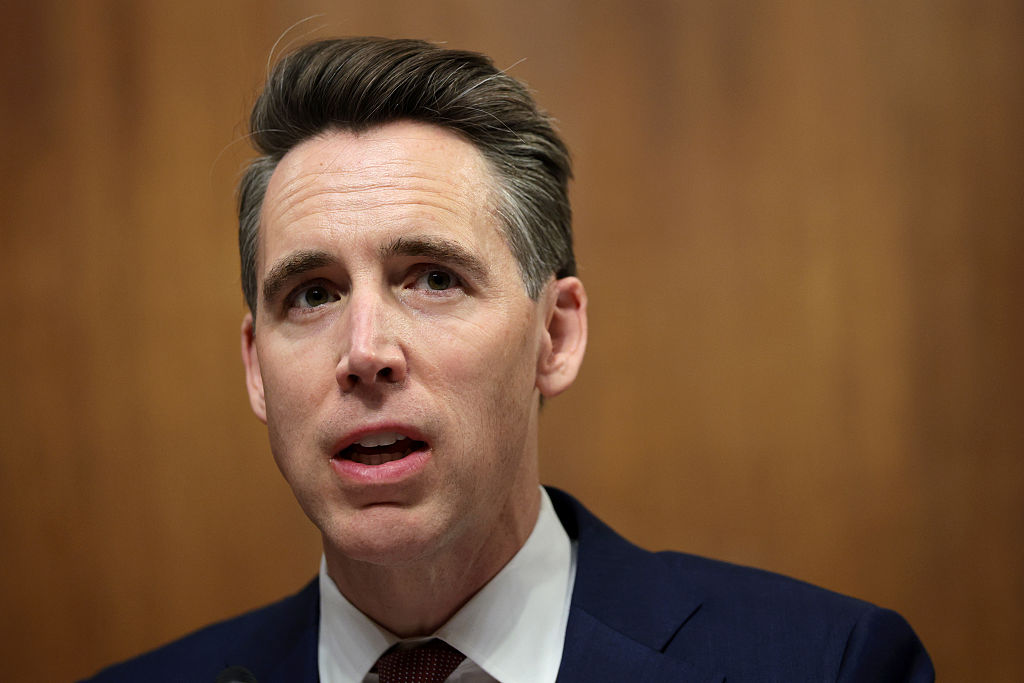Senator Josh Hawley of Missouri has been one of Donald Trump’s fiercest allies on Capitol Hill. But since his easy re-election last November, he’s also been someone within the Republican party who demanded public commitments from Trump’s nominees on several issues of importance to him – areas of concern that include the influence of big tech, the encroaching role of China and a promise on the part of nominees with little or no record on the abortion issue to support pro-life policies.
Senator Hawley spoke to me on the 100th day of Trump’s second presidency about what he’s seeing on tariffs, foreign policy and China. But first, we discussed a new study he believes should result in a major reconsideration by the Food and Drug Administration on the most commonly used abortion pills – potentially a hot-button issue for the GOP in the midterms. This interview has been lightly edited.
Ben Domenech: You are touting the latest developments on mifepristone, the abortion pill, as astonishing. What is your goal at this point in terms of what you’d like to see from the admin, and particularly the FDA, on looking at this issue again?
Josh Hawley: They need to reinstate the safety procedures, mechanisms, regulations that were in place back before the most recent administration and before the 2016 changes that President Obama did on his way out the door. I mean, this is mifepristone: since it has been available in the United States, it has long had basic dispensing regulations, with in-person dispensing prescription by an actual physician and then in-person administration and mandatory follow-up visits. And it’s for the reasons that we see in this most recent study, a bombshell study with 865,000 different cases analyzed. You’ve got that just eye-popping numbers of adverse health events – over 10 percent is astounding. And the reason that all of these safety procedures and guardrails were in place was because of just how dangerous chemical abortions are. So my message to the administration is: those safety regulations need to go back into effect.
Ben Domenech: Do you think the administration understands that the people who told so many of the hellish stories that have been promoted by the media coming out of this are actually directly due to this policy, as opposed to the way that states reacted to Dobbs?
Josh Hawley: I don’t know that they do. The media reporting has been, as you point out, extremely misleading at best. But what we’re really seeing is women who are in some horrible cases where we’ve had boyfriends, family members who have given women the drug without their consent, without their knowledge that has led to death or near death. And you’ve had cases where individuals have done that. But even when you have women who are taking this drug on their own, as they’re now able to do, they do not have access to regular medical care. What has the FDA been telling them? “Well, just go to your nearest emergency room.” Well, good grief, I mean that’s not a plan for dealing with an adverse event. And that’s why the numbers that we see here, with these adverse events 22 times higher than what the FDA label says. These are astounding numbers. And again, you know, we’re not talking about a stomach ache. We’re talking here about hemorrhaging. We’re talking about life-threatening complications because of this drug.
Ben Domenech: So when it comes to the people who’ve been in part of this second Trump term, one of the concerns that was raised by a lot of the folks in the pro-life community was about how much they would be willing to do on this front, given that a lot of people simply kind of want to move on, sweep it under the rug or not really address it. Do you have confidence that this is something that will rise to the level, that the admin takes it seriously and actually looks at it?
Josh Hawley: Well, if this isn’t serious, if this kind of data is not serious enough to warrant action, then I don’t know what would be. And in terms of a pro-life priority, there’s none higher than this. We’re talking now about the fact that abortions are now not just more widely available, but are more widely carried out in greater numbers than they have been in years. There’s a recent article in Washington Monthly by a professor – and she’s very, very pro-abortion – she was trumpeting this fact that she pointed out that abortions are at their highest levels in years. They’re in many cases more widely and easily available now than when Roe was still the law of the land. So this is a five-alarm fire when it comes to protecting the innocent unborn and also for protecting women’s health. These adverse events are shocking.
Ben Domenech: After 100 days, you obviously are paying attention to not just this, but other areas that impact the abortion arena and the pro-life cause. Are you optimistic? Hopeful? Do you like what you’re seeing thus far, or do you think that this is something that needs to be a bigger priority when it comes to appointments, when it comes to how much they value this as an important subject when they’re looking at nominees?
Josh Hawley: Well, I’ve tried to make it clear to the administration and certainly to the nominees who have come before me that this needs to be a priority. And this is why you’ve seen me extract pro-life commitments out of Robert F. Kennedy, from Dr. Makary, from Dr. Oz. I will say that that all of them have been willing to say, “Yes, we will be pro-life. Yes, we will follow President Trump’s policies from his first term.” So, you know, that’s good. But I do think that the ground has changed, the world has changed from the Trump first term. So it’s good to say yes, we will at a minimum go back to those policies.
The President’s early actions were outstanding. His first couple of weeks, he pardoned the pro-life prisoners, reinstated the Mexico City policy – all outstanding. But we’ve got to realize that we’re in a very different world now. We’re in a world where telehealth providers in about eight states can now provide abortion drugs, prescribe abortion drugs to anybody all over the country, regardless of state law, and mail those drugs into states, regardless of what voters in the states want. The president says he’s in favor of Dobbs. He appointed the justices who handed down the Dobbs decision. But Dobbs is directly undermined by the current mifepristone regime that we have, and so is women’s health. And I think they’ve got to grapple with that. Congress needs to grapple with that. And clearly again, this study is a wake-up call for everybody involved here.
Ben Domenech: On the tariffs, the president is in Michigan today announcing this deal on auto parts. One of the critiques of this tariff approach has been that if you want to bring back American manufacturing, that really the focus should be on finished goods and not the parts to make those goods. What’s your take on how to improve this tariff regime in a way that can be predictable and also involve more investment in American manufacturing?
Josh Hawley: I think he’s trying to do that. I think what you’re seeing is successive refinements here, particularly on the auto side. I will just say, as a guy who represents a state with a lot of auto jobs – and as a guy who went and walked a picket line with the auto workers in my state when they were on strike a year and a half ago – the response from auto workers in Missouri to these tariffs, the auto tariffs in particular, has been extremely enthusiastic. Their impression is, and I think they’re right, that the president is on the right track here. And your point about finished goods is, I think, a good one, well taken. I think the White House is taking that on board.
The President’s trying to do something here that you and I haven’t seen in our lifetimes. I mean, this is a total break with our general approach, the establishment approach to trade – as you know, you’ve reported on it – the establishment on both sides, both parties. So this is something new. It is a major departure. And I think he’s iterating, he’s figuring it out, and one thing you say about this president, he’s not afraid to adjust. He will change. And I think he’s doing that. He’s trying to figure out what tariffs need to be long-term and permanent in order to encourage reshoring, what tariffs are good leverage for getting better trade deals with allies. And I think the answer is that really nobody knows until you go through the process. And he’s figuring it out. And you know more power to him.
Ben Domenech: One aspect of this that’s receiving additional reporting and attention in the past couple of weeks is the impact this is going to have on families, particularly through the cost of goods like strollers, car seats, et cetera, which overwhelmingly come from China, and they’re set up to abide by American regulations. Do we need to have a real look at how we regulate some of these products in order to make sure that we don’t basically give a gift to the Chinese, where they’re the only ones who can do those?
Josh Hawley: Maybe. I think that’s an interesting point. I tell you what else that we can do, though, is we can give middle-class and working-class families a tax cut, and we ought to do that in the reconciliation bill. I would just say to my Republican colleagues, what is it that the Republican party has hung its hat on for 30, 40 years now? It’s cutting taxes. Let’s cut some taxes for working people. The President realizes this. He knows this. He wants to do it. I mean, he ran on it, right? That’s what no taxes on tips is. No taxes on overtime. We got to go even further than that. We ought to expand the child tax credit. That is a tax cut. We ought to make it fully applicable against the payroll tax. Two-thirds of Americans pay more in payroll tax than in income tax. Those are our voters now as Republicans. Those are Trump voters. They’re the people who have been decimated in the last four years and more under this economy. And we ought to across the board here if we want to help those voters with all of the cost of living issues, most of which are inherited from the last administration. We need to give them a tax cut.
Ben Domenech: It seems to me that after this first 100 days, there isn’t an area of policy that has been more dramatically changed than the United States approach to foreign policy. As you look forward, what do you think is the outcome the next 100 days holds? Are you optimistic about the direction that Ukraine and Russia are taking? Are you concerned about the possibility of a strike on Iran? What’s top of mind for you as a foreign-policy issue that is going to come to a head in the next 100 days?
Josh Hawley: Well, hopefully where we’re headed here is towards a rebalancing of our focus. We have got to get into a position to resist further Chinese imperialism and expansion, and we’re just not in a position to do so. And we haven’t been serious about it economically. We haven’t been serious about it militarily. And we have got to get into position. And I hope and believe what part of what the president is doing here overall is he’s rebalancing us toward what is our greatest geopolitical threat in many ways, our greatest economic threat, which is the People’s Republic of China.
At the same time, what I also hope will come out of this with our NATO allies is a new understanding of our burden-sharing arrangement. We need our NATO allies. We need them, not least because we are the only country really situated and capable of dealing with the Chinese threat globally, and none of our European allies are. But our European allies are capable together of addressing the Russian threat on their continent. And so we need them to do that. And I think we just need to reach a new modus operandi here, a new understanding between us as allies that we’re going to ask them to do more in the conventional defense of Europe when it comes to countering Russia and we, in turn, are going to to bear the lion’s share of the burden when it comes to China, because we’re the only country that’s positioned to do that. That’s how we’re going to burden share for the 21st century. I think that is workable. I think that’s the only arrangement that’s workable. And I hope that that is where we’re getting to.
This is a lot of change in one sense, although in another sense, I really think you see the vector of change across administrations. If you zoom out, way up to the 50,000-foot view, this vector of change really has been headed in this direction back since probably 2008, 2009, 2010. As China has gotten so much stronger, we’ve been in this long position of trying to rebalance while we deal with the issues on our border, while we deal with Russia and their nuclear capabilities. So I hope that we’re in a rebalancing mode here. We have new threats, we’ve got a new major opponent. This is something else that you and I haven’t seen in our lifetimes. We’ve never seen a peer, a truly peer competitor in the military economic space. We have memories, maybe, of the Soviet Union in its dying days. They weren’t peer competitors. China is. We’re gonna have to rethink a lot of things in order to make sure that we are standing up for our national security, but also preserving liberty across the world in the face of what is a very real danger that China poses. So there’s a lot of work to do here, and I hope the next hundred days will see progress on all of those fronts.


























Leave a Reply